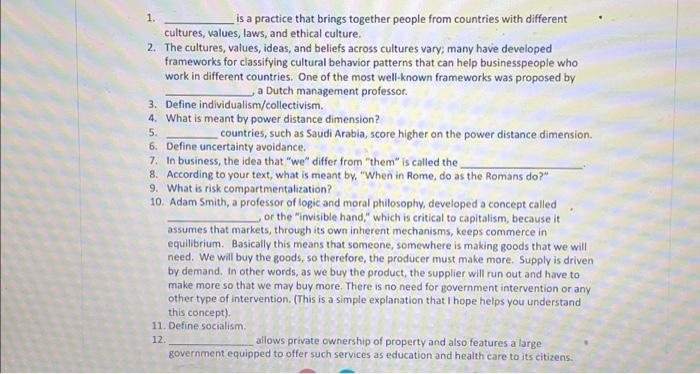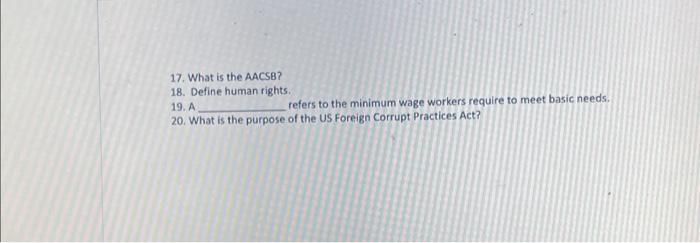Answered step by step
Verified Expert Solution
Question
1 Approved Answer
1. is a practice that brings together people from countries with different cultures, values, laws, and ethical culture. 2. The cultures, values, ideas, and beliefs
1. is a practice that brings together people from countries with different cultures, values, laws, and ethical culture. 2. The cultures, values, ideas, and beliefs across cultures vary; many have developed frameworks for classifying cultural behavior patterns that can help businesspeople who work in different countries. One of the most well-known frameworks was proposed by a Dutch management professor. 3. Define individualism/collectivism. 4. What is meant by power distance dimension? 5. countries, such as Saudi Arabia, score higher on the power distance dimension. 6. Define uncertainty avoidance. 7. In business, the idea that "we" differ from "them" is called the 8. According to your text, what is meant by, "When in Rome, do as the Romans do?" 9. What is risk compartmentalization? 10. Adam Smith, a professor of logic and moral philosophy, developed a concept called or the "invisible hand," which is critical to capitalism, because it assumes that markets, through its own inherent mechanisms, keeps commerce in equilibrium. Basically this means that someone, somewhere is making goods that we will need. We will buy the goods, so therefore, the producer must make more. Supply is driven by demand. In other words, as we buy the product, the supplier will run out and have to make more so that we may buy more. There is no need for government intervention or any other type of intervention. (This is a simple explanation that I hope helps you understand this concept). 11. Define socialism. 12. allows private ownership of property and also features a large government equipped to offer such services as education and health care to its citizens.



Step by Step Solution
There are 3 Steps involved in it
Step: 1

Get Instant Access to Expert-Tailored Solutions
See step-by-step solutions with expert insights and AI powered tools for academic success
Step: 2

Step: 3

Ace Your Homework with AI
Get the answers you need in no time with our AI-driven, step-by-step assistance
Get Started


